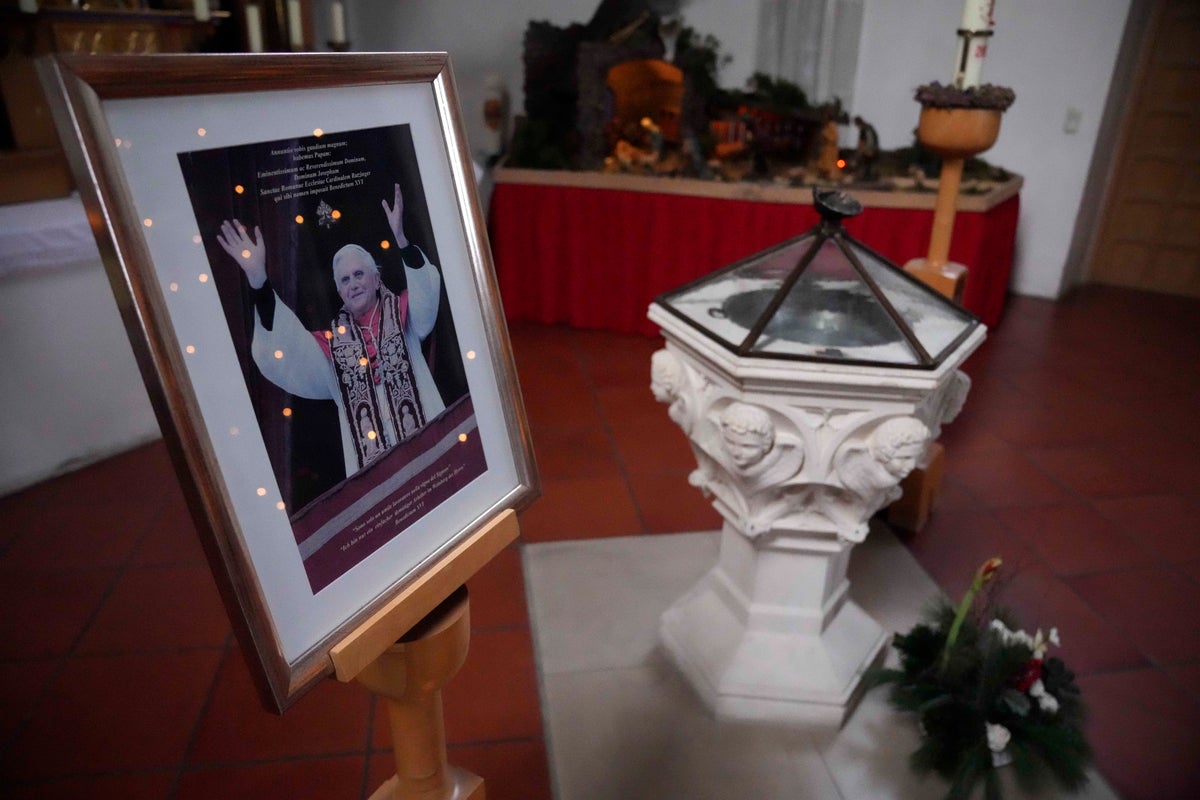
People in Pope Benedict XVI’s Bavarian homeland prayed Thursday for the retired pontiff, a favorite son of the region even 40 years after he left Germany for the Vatican and nearly a decade after his resignation stunned the world.
At the St. Oswald church in the small town of Marktl am Inn, where a future pope named Joseph Ratzinger was baptized more than 95 years ago, Sandra Maier, the lay head of the local congregation, put up a framed picture of Benedict, lit a red candle and arranged a small pew so parishioners could kneel and pray for him.
Maier, who was also baptized at the church, said she was “shaken and deeply moved by the news” from the Vatican on Wednesday that Benedict’s health had deteriorated. “I wish for him to have an easy time now and not suffer so much,” she said.
“We are proud here in Marktl that we have a Bavarian pope,” Maier, 50, said, recalling the two times she met him personally. “He’s a good man and was a great pope.”
The German Catholic Church’s leadership called for prayers for Benedict after the Vatican’s announcement. “Pope Benedict XVI has prayed for us these many years; now let us pray for him,” said Bishop Rudolf Voderholzer of Regensburg, a city where Ratzinger taught at the university in the 1970s.
Bishop Stefan Oster of Passau, the diocese where Marktl is located, said Benedict was alert but physically very weak when he saw him in November. “If he is now getting even weaker, it is easy to imagine that he is on the last stretch of his earthly way,” Oster said. “Please all accompany him in prayers.”
The Vatican said Thursday that Benedict was lucid, conscious and stable but his condition ”remains grave."
In Altoetting, a major pilgrimage destination a few miles from Marktl that he visited many times in his life, including as pope in 2006, some locals headed to the Chapel of Grace on the town square to pray for Benedict.
Herbert Hofauer, the retired mayor of the deeply Catholic town, has known the pope emeritus for 40 years. He said he last saw Benedict during a private spring visit in Rome, but news of his worsening health "still came as a surprise.”
“I know that he has been preparing for his coming home in the eternal world,” Hofauer, 66, told The Associated Press. “He has been preparing for a long time for the meeting with the eternal judge ... and I believe that he is very calmly looking forward to this encounter.”
Hofauer, who was mayor of Altoetting from 1995 to 2020, lauded Benedict for never forgetting his Bavarian roots. The future pope made many pilgrimages to the town starting when he was a a child, coming with his parents to pray to the wooden statue of the Virgin Mary in the Chapel of Grace, Hofauer said.
Benedict’s presence looms large in Altoetting. A life-sized golden statue of the retired pontiff was erected on the market square in 2016. Tourist stores sell little clay figures of him, and his image hangs in the town's churches.
Ingrid Simmel, who was on a day trip to buy a wood-carved sculptured of Jesus Christ as a newborn in his crib, said she was worried but not surprised about the retired pope's worsening health.
“He’s very old and has been ill for a long time,” said Simmel, 81, who came to Altoetting from a town across the nearby Austrian border. “I will include him in my prayers here and wish him that he will go to heaven – where we all want to go eventually.”
While Benedict has a place in the heart of this very Catholic corner of Bavaria and there was national pride in a German pope, he has long drawn mixed reviews in Germany as a whole — a country where Christians are roughly evenly split between Catholics and Protestants and where many didn’t appreciate his conservative approach.
Years after he resigned as pope in 2013, deep divisions are apparent in the German church between relative liberals and traditionalists in Benedict’s mold as bishops and lay representatives engage in a potentially trailblazing reform process that has drawn suspicion from the Vatican.
The process was launched in response to the child sex abuse scandal that has rocked the church in Germany and elsewhere in recent years, contributing to large numbers of Germans formally leaving the church. In January, a report on decades of abuse cases commissioned by the Munich diocese, where Benedict was archbishop from 1977 to 1982, faulted the then-Cardinal Ratzinger's handling of four cases.
Benedict, who turned around the church's approach to clergy sexual abuse in his time at the Vatican, asked forgiveness for any “grievous faults” in his handling of cases but denied any personal or specific wrongdoing.







